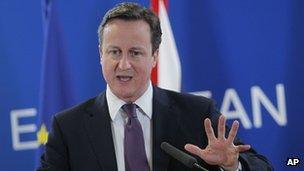Big business deeply troubled by Cameron's veto
- Published
- comments

Vince Cable and businesses are worried that David Cameron will no longer be heard by Europe's decision makers
When Vince Cable travels the world selling the attractions of the UK as a place where huge companies and deep-pocketed investors should put their money, pretty much the first thing Britain's business secretary points out is that the UK is part of the biggest market in the world - the European Union's single market - and (he says) offers a more welcoming climate for business than much of the rest of the EU.
Which is why both Mr Cable and many business leaders are profoundly uneasy about David Cameron's refusal in the early hours of Friday morning to allow the eurozone's governments to adapt the EU's treaties such that they will incorporate reforms seen as necessary to save the euro.
To be clear, Mr Cable is not about to resign (all rumours to the contrary). He's unhappy, but keen to do what he can to rectify what he fears may be a serious economic error by the prime minister - given how vital it is to stimulate investment in productive capacity in Britain, so that we become a nation that starts to pay its way in the world, rather than living on borrowed money.
Removal
As for our biggest companies, well the bosses of three of them (none of whom would be seen as pro-European zealots) have all said to me that they are unhappy about the prime minister removing himself from the negotiating table not only on the future of the eurozone but also - potentially - on other issues of huge importance to the UK.
Here is what one said to me: "Margaret Thatcher was a constant thorn in the side of European leaders, but she never vacated the negotiating table; I am anxious by the implications of what the prime minister has done."
Also, John Cridland, the director general of the CBI, concedes to me that his members are worried. He says the prime minister needs to spell out in detail - in his Commons statement tomorrow - why he couldn't sign up for the proposed treaty reforms, or what (if anything) the French president and German chancellor did to make that impossible.
Because, as Mr Cridland says, it is not obvious that Mr Cameron made it easier to protect the interests of the City of London - which is what the prime minister said he was trying to do - by forcing the eurozone's members to design new institutional arrangements to manage their affairs.
Erosion
In fact, as all the business leaders to whom I spoke were quick to point out, the decision by the 17 eurozone nations - plus as many as nine other EU states - to opt for an intergovernmental agreement that excludes the UK raises the prospect of this group becoming (explicitly or implicitly) the decision-making body for all EU economic and business issues, especially those relating to the single market.
So, as the influential head of a major multinational said to me, if you are a Chinese or Indian multinational, and you have a choice between investing in Germany, the Netherlands or the UK, and you fear that the UK's influence in the single market has been eroded - and you also see some of the right wing of the governing Tory party seemingly in favour of the UK leaving the EU altogether - you probably won't put your incremental investment in the UK.
Over the past 25 years, inward investment has become more and more important to the UK. And the UK is relatively more dependent on big multinationals - in finance, pharmaceuticals, media and so on - than almost all rival economies.
'No, nay, never'
Now the thing about multinationals is that they are citizens of the world, rather than any particular country. They can base their respective HQs and invest their cash where the climate is most propitious. And if they begin to see the UK as an isolated island, they will not wish to stay.
So it would really matter if the UK's place in the world's biggest market, the European single market, were somehow in doubt. Which is why having done his "no, nay, never" in the early hours of Friday morning, businesses are now desperate to hear a positive statement from Mr Cameron about how the UK's position in the single market can somehow be buttressed.
All that said, everything I've just written could turn out to be wholly irrelevant - not even as useful as tomorrow's wrapping for fish and chips. Because if the eurozone were to melt down, and that remains a very real and present danger (as I pointed out on Friday), the priority then will be to limit the inevitable havoc for the economy (including ours) and build a whole new European entente.